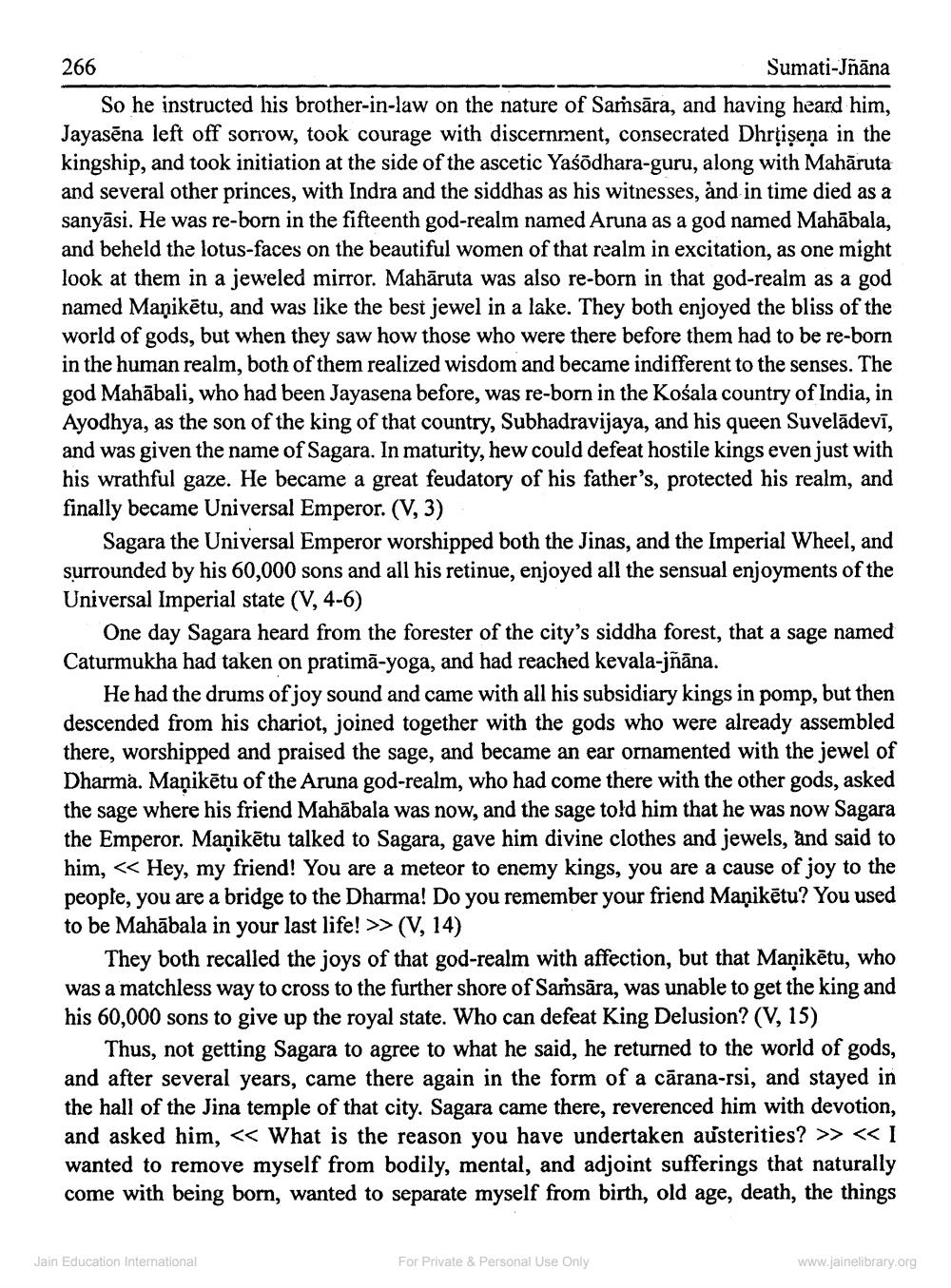________________
Sumati-Jñāna
So he instructed his brother-in-law on the nature of Samsara, and having heard him, Jayasena left off sorrow, took courage with discernment, consecrated Dhrțişena in the kingship, and took initiation at the side of the ascetic Yasodhara-guru, along with Mahāruta and several other princes, with Indra and the siddhas as his witnesses, and in time died as a sanyasi. He was re-born in the fifteenth god-realm named Aruna as a god named Mahābala, and beheld the lotus-faces on the beautiful women of that realm in excitation, as one might look at them in a jeweled mirror. Mahāruta was also re-born in that god-realm as a god named Maņikētu, and was like the best jewel in a lake. They both enjoyed the bliss of the world of gods, but when they saw how those who were there before them had to be re-born in the human realm, both of them realized wisdom and became indifferent to the senses. The god Mahabali, who had been Jayasena before, was re-born in the Kośala country of India, in Ayodhya, as the son of the king of that country, Subhadravijaya, and his queen Suvelādevī, and was given the name of Sagara. In maturity, hew could defeat hostile kings even just with his wrathful gaze. He became a great feudatory of his father's, protected his realm, and finally became Universal Emperor. (V, 3)
266
Sagara the Universal Emperor worshipped both the Jinas, and the Imperial Wheel, and surrounded by his 60,000 sons and all his retinue, enjoyed all the sensual enjoyments of the Universal Imperial state (V, 4-6)
One day Sagara heard from the forester of the city's siddha forest, that a sage named Caturmukha had taken on pratima-yoga, and had reached kevala-jñāna.
He had the drums of joy sound and came with all his subsidiary kings in pomp, but then descended from his chariot, joined together with the gods who were already assembled there, worshipped and praised the sage, and became an ear ornamented with the jewel of Dharma. Manikētu of the Aruna god-realm, who had come there with the other gods, asked the sage where his friend Mahābala was now, and the sage told him that he was now Sagara the Emperor. Maņikētu talked to Sagara, gave him divine clothes and jewels, and said to him, << Hey, my friend! You are a meteor to enemy kings, you are a cause of joy to the people, you are a bridge to the Dharma! Do you remember your friend Manikētu? You used to be Mahabala in your last life! >> (V, 14)
They both recalled the joys of that god-realm with affection, but that Manikētu, who was a matchless way to cross to the further shore of Samsara, was unable to get the king and his 60,000 sons to give up the royal state. Who can defeat King Delusion? (V, 15)
Thus, not getting Sagara to agree to what he said, he returned to the world of gods, and after several years, came there again in the form of a carana-rsi, and stayed in the hall of the Jina temple of that city. Sagara came there, reverenced him with devotion, and asked him, << What is the reason you have undertaken austerities? >> << I wanted to remove myself from bodily, mental, and adjoint sufferings that naturally come with being born, wanted to separate myself from birth, old age, death, the things
Jain Education International
For Private & Personal Use Only
www.jainelibrary.org




